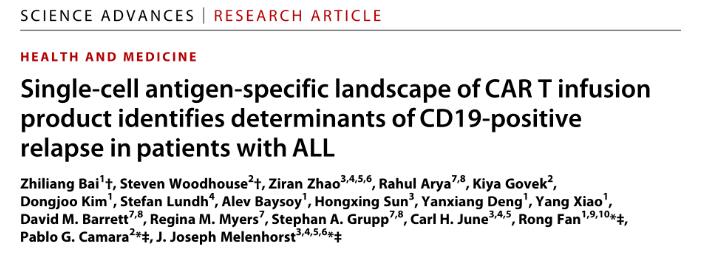CAR T-cell therapy targeting CD19 is highly effective in children and adults with B-ALL. 90% of patients initially responding to the therapy. Yet despite this high response rate, nearly 50% of patients relapse, and a large proportion of these patients remain CD19-positive.

The researchers first investigated single-cell activation of CAR-T products from 12 ALL patients under CAR-specific stimulation or T-cell receptor (TCR)-mediated activation and compared with unstimulated controls . The research team divided 12 patients into long-term complete remission group (CR, no relapse over 54 months, n=5), CD19-positive relapse group (RL, median time to relapse=9.6 months, n=5) and non-responder group Group (NR, n=2). The study found that CAR T cells from RL patients were significantly deficient in Th2 by comparing the cytokine expression profiles co-expressed in CD19-positive relapse patients and tolerance responders. Differential gene expression analysis showed that all major genes encoding Th2 functions, including IL13, IL5, IL4, and the upstream regulator GATA3, were upregulated in CR patients compared with RL patients.
To systematically validate these predictive biomarkers, we evaluated a larger patient review cohort (n=49) with flow cytometry, and the results also confirmed a significantly increased CAR+Th2+ frequency in CR patients compared with RL patients . In addition, 22 patients were assessed for Th2 functional strength using multiple secretomic analyses and found consistent results. These findings suggest a potential strategy to improve therapeutic efficacy by redesigning CAR-T products with enhanced type 2 signaling or enhancing Th2 function after infusion.
This study found that Th2 functional deficiency is related with CD19-positive relapse through single-cell multi-omics analysis of CAR T products. This enhances our understanding of the relapse mechanism of CAR-T cell therapy and our future design and optimization of CAR-T products. It provides a theoretical basis for improving the treatment effect and prolonging the time.